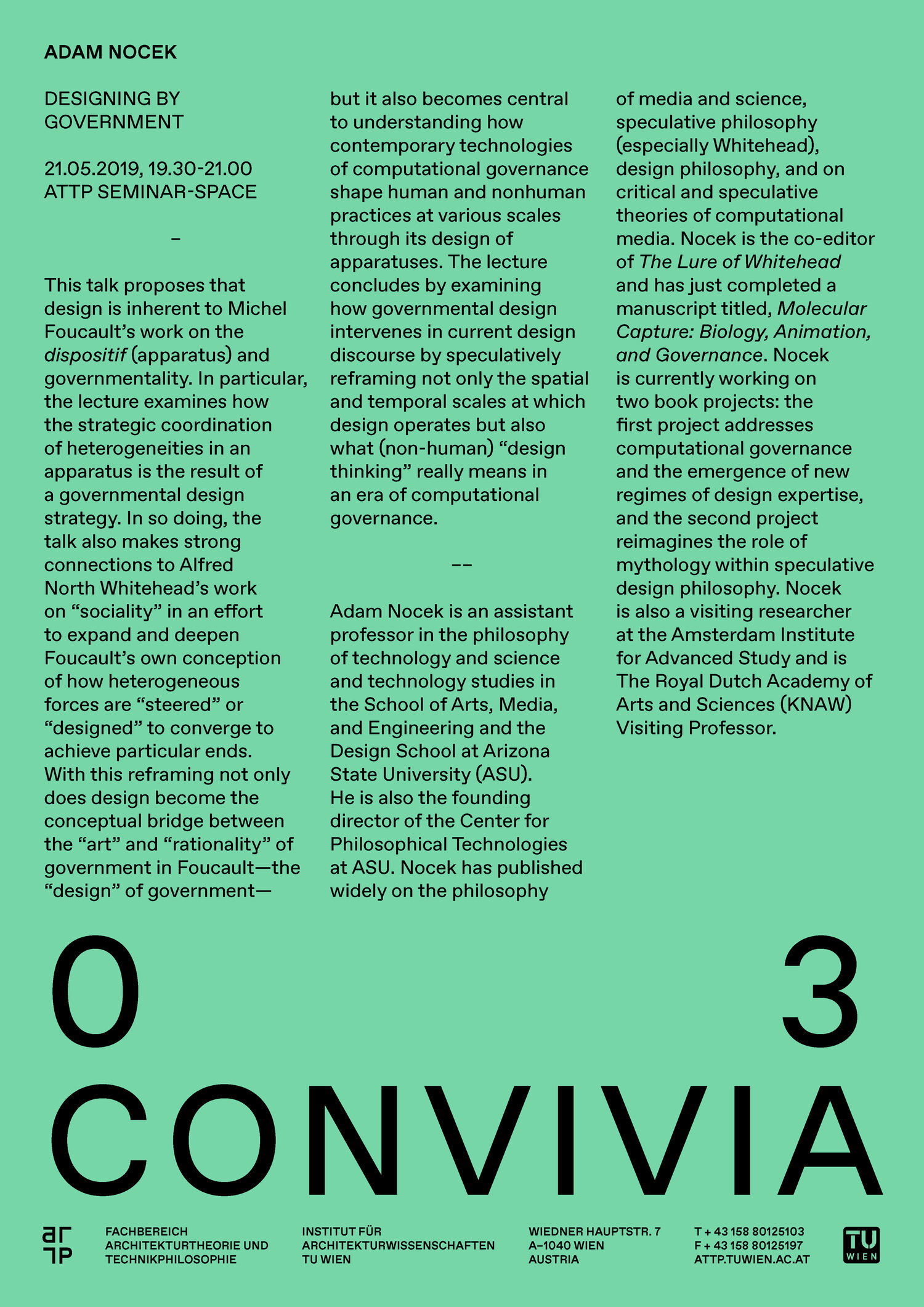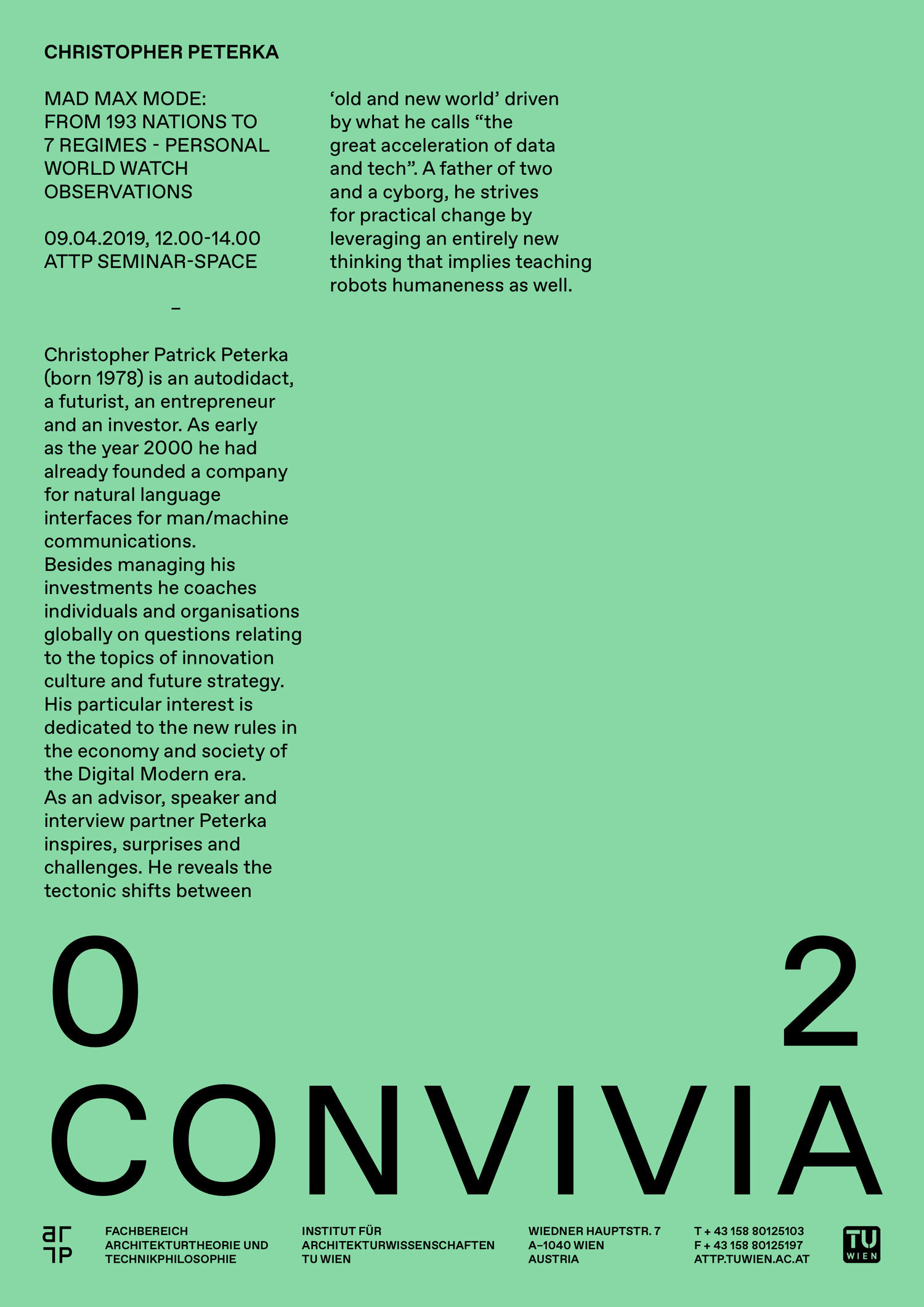ARCHITEKTUR UND THEORIE – EIN SYMPOSIUM
3. Vernetzungstreffen der deutschsprachigen Lehrstühle für Architekturtheorie
1. bis 3. November 2018 an der Technischen Universität Wien
Im Anschluß an die erfolgreichen ArchitekturTheorieTage in Graz (2016) und Hannover (2017) wollen wir bei diesem Treffen die Wichtigkeit des Faches, und die Organisation zur Förderung dieser Wichtigkeit zum Thema zu machen: Wir schlagen für dieses nächste Treffen vor, ein experimentelles Format auszuprobieren das uns je einzeln wie auch gemeinsam Argumente zur Hand gibt, um unser Fach in der Wahrnehmung von Studierenden, KollegInnen, Forschungsförderung zu stärken.
Dieses Format schlägt ein Rollenspiel vor: wir möchten Euch alle einladen, unser nächstes Treffen in Wien Anfang November 2018 in der philosophisch/literarischen Symposion/Gastmahl-Tradition zu begreifen, bei dem wir uns, mit unseren je unterschiedlichen Interessen und Anliegen, alle als „Freunde der Architektur“ treffen und das was uns begeistert/was wir wichtig finden, als Beiträge in der Form von 15-minütigen rhetorischen Reden (Oratorien) mitbringen. Damit würden wir nicht nur von der Wichtigkeit der Architektur sprechen, sondern auch jene der Architekturtheorie demonstrieren (da wir der Architektur gegenüber nicht sprachlos sind sondern von ihr auf unterschiedlichste Weise präzise, informativ, kritisch und mit einem Anliegen, bewahrend wie modernisierend, zu reden wissen).
Das Ziel dieses experimentellen Formats ist es, dass wir alle mit einem Bündel von starken und durchdachten Artikulationen von für die Architektur allgemein relevanten Themen, von herausfordernden und präzisierenden Formulierungen, von gewichtigen und auch tendenziösen Argumenten nach Hause gehen – mit besserem Verständnis des gemeinsamen Kräftefeldes in dem wir unser Fach vertreten.
AUSFÜHRLICHERES INFORMATIONSDOKUMENT
Zum dowload here
PROGRAMM
Donnerstag, 1. November: Abendprogramm (öffentlich)
Das Treffen startet mit einem öffentlichen Event am Donnerstag Abend, der das Thema des diesjährigen Treffens – die Tradition des Symposiums und des Verfertigens von Gedanken zu Reden – in einen dreifach beleuchteten, mittelbaren Fokus stellt.
18:00-18:30 Introduction Vera Bühlmann, TU Wien
INSTEAD OF STATEMENTS – AN ENCOMIUM TO DOMESTIC ARCHITECTONICS
18:30-19:30 Keynote Lecture Martin Delbeke, ETH Zürich
ARCHITECTURAL HISTORY WITHOUT HISTORY?
XENOTHEKA, AN EXPERIMENTAL DIGITAL LEARNING ENVIRONMENT
19:30-20:30 Reading from Plato’s Symposium
Sebastian Michael (Dozent und Gast, ATTP TU Wien)
ENCOMIA TO LOVE. THREE AND A HALF ORATIONS
20:30 Apero
Freitag, 2. November: Tagesprogramm und Abendessen (Fachschaft ATT intern)
Am Freitag Vormittag beginnt das Vortragen der Reden in kleiner Runde und dauert (inkl. 2-h Mittagspause) bis zum Abend. Für jede Rede ist eine halbe Stunde vorgesehen, so dass Zeit bleibt, um 1) die Rede kurz einzuführen/zu kontextualisieren, 2) die Rede zu halten oder von Sebastian Michael (ein Schauspieler und Schriftsteller) halten zu lassen, und 3) gemeinsam Argumente aus der Rede zu isolieren und zu sammeln.
09:30 Kaffee und Gipfeli
10:00-10:30 Christoph Grafe, Bergische Universität Wuppertal
–––– Titel kommt noch
10:30-11:00 Gernot Weckherlin, BTU Cottbus-Senftenberg
DIE BAUKUNST ALS ERZIEHERIN
11:00-11:30 Karl R. Kegler, HS München
ZU DEN RÜCKSEITEN DER ARCHITEKTUR
11:30-12:00 Achim Hahn, TU Dresden
ÜBERLEGUNGEN ZUR WIEDERBELEBUNG EINER 'ARCHITEKTONISCHEN' TECHNE
12:00-14:00 Mittag
14:00-14:30 Daniel Gethmann, ASSOC. PROF. TU Graz
KONSTRUKTIVISTISCHE ARCHITEKTURTHEORIE
14:30-15:00 Jasper Cepl, HS Anhalt
DAS SCHÖNE IN DER ARCHITEKTUR
15:00-15:30 Anselm Wagner, TU Graz
ARCHITEKTUR UND EMOTION
15:30-16:00 Susanne Hauser, UDK Berlin (prov.)
DIAGNOSTIK
16:00-17:00 Gemeinsames Sammeln und Bündeln der Ideen
19:30 Abendessen
Samstag, 3. November (Fachschaft ATT intern)
Am Samstag Vormittag ist Zeit, die Sammlung an Argumenten und Haltungen zu reflektieren – und um Pläne zu machen. Im Anschluss gemeinsame Wien-Exkursion bei Interesse.
10:00-12:00 Gemeinsame Diskussion und Pläne
Anschliessend Wien Exkursion (organisiert von Oliver Schürer, TU Wien)
Source:: www.attp.tuwien.ac.at/architekturtheorietage-2018






























